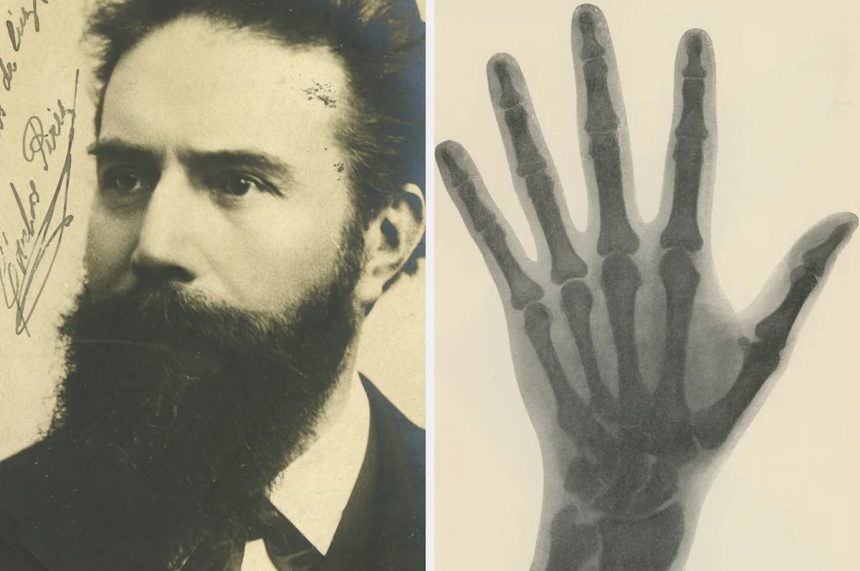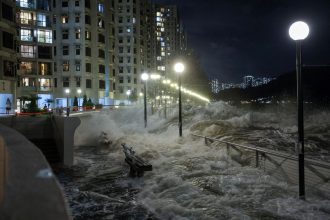Recently, I saw a post from user E1ite on the popular Ask Reddit page, asking people, “What is the smallest human accident that had the largest impact in history?” The answers are pretty amazing. I thought they were so cool, I just had to share; so, here are some of the best:
1. “The discovery of X-rays. Wilhelm Röntgen,” the first-ever recipient of the Nobel Prize for Physics, “noticed a screen glowing by accident while experimenting with cathode rays, and realized he was looking at something totally new.”
1970s / Getty Images, Mikroman6 / Getty Images
“He actually thought he was going insane and didn’t believe what he was seeing. Later, his wife came in and saw the same thing, so he knew it was real.”
2. “A small bakery accident in Thomas Farriner’s shop (possibly just an unattended oven or candle) set off the Great Fire of London. It destroyed most of the medieval city, but weirdly led to a better-planned modern London afterward. One baker forgot to blow out a flame…goodbye, London.”
Sepia Times / Getty Images

Bettmann / Getty Images
4. “Small fry, but: Nintendo asked Sony to develop a CD drive for their SNES. Nintendo pulled out, but Sony thought, ‘we’ve come so far, let’s tidy it up and release it.’ Hence, the PlayStation one. Without Nintendo’s invitation, Sony would not be in the video game business.”

Ctrphotos / Getty Images

Bettmann / Getty Images
6. “In 1945, Percy Spencer was standing near a magnetron, and the candy bar in his pocket started to melt. Now, we can all have cold food in hot bowls as a result.”

Nonneestudio / Getty Images
—u/JeffurryS
7. “Albert Hofmann spilling a couple of drops of LSD on his hand. He decided to document how he felt.” Here’s what Hoffman wrote about the experience:

Ullstein Bild Dtl. / Getty Images
“[I was] affected by a remarkable restlessness, combined with a slight dizziness. At home, I lay down and sank into a not unpleasant intoxicated-like condition, characterized by an extremely stimulated imagination.”
“[In] a dreamlike state… I perceived an uninterrupted stream of fantastic pictures, extraordinary shapes with intense, kaleidoscopic play of colors. After some two hours, this condition faded away.”
8. “A thousand years ago in China, some alchemist was mixing ingredients together, trying to make a life-extending potion. He heated the mixture, which caught on fire and burned extremely violently.”

Xiaoke Chen / Getty Images
“BOOM! Primitive gunpowder was invented.“
—u/Kitten-Eater
9. “An assassin stopped at a delicatessen, then saw his target driving past him in an open-topped car, having taken a wrong turn…and that’s how WWI kicked off.“
Universal History Archive / Getty Images, Bettmann / Getty Images
—u/chromane
10. “The Great Molasses Flood of Boston is up there. It gave us modern engineering requirements and building codes. Has saved tens of thousands to millions of lives in the last 106 years.”

Boston Globe / Getty Images
11. “A scientist used a f—ing screwdriver to test a radioactive core and gave us a look at what radiation poisoning can do to the human body.”
Los Alamos National Laboratory / Via en.wikipedia.org, Los Alamos National Laboratory / Via en.wikipedia.org
12. “Spreading smallpox to the New World.”
—u/allerious1
13. “The addition of sulfur to natural rubber by Charles Goodyear. He accidentally dropped a mixture of rubber and sulfur onto a hot stove, discovering that it hardened and became elastic and durable.”

Hapabapa / Getty Images
—u/mintyjam
14. “London doctor John Snow (not the true king of Westeros) noticed a cluster of cholera cases in one small area. He traced it back to a water pump contaminated with cholera from a nearby horse stable. Now we have municipal sewage systems, and most people living in Western countries don’t even know what cholera is. Thanks, Doc.”

Ktsimage / Getty Images
—u/wardog1066
15. “The metric system not coming to America. In 1793, at the request of Thomas Jefferson, Joseph Dombay was carrying a standard kilogram example from France back to America when his ship was blown off course and captured by pirates. As a consequence, Congress was unwilling to formally adopt the metric system. A minor consequence of that was that in 1990, the Mars Climate Orbiter crashed due to one NASA team using imperial calculations vs. another team using metric.”
Graphicaartis / Getty Images, NASA / Getty Images
—u/Cdn_Nick
16. “Probably the Titanic. Just one ship not slowing down for ice warnings, and it changed history. A single iceberg hit turned into one of the most famous disasters ever. Then, fast forward a century, and people repeat history with OceanGate.”

Ralph White / Getty Images
“The Titanic did actually lead to standards in radio communication.
The Titanic had been warned via radio of icebergs, but told the other radio operators to shut up. Being that there were no standards at the time, the radio operators aboard the Californian turned off their radios and went to sleep, missing all the distress signals from the Titanic.
As a result, radios must be left on, and a radio operator must be available.”
—u/Calm_seasons
Dmbaker / Getty Images, Historical / Getty Images
“Thomas Midgley Jr. He also invented Freon.”
“It was intentional, since it improved engine performance. But it did have huge, awful effects worldwide.”
—u/deleted
18. And finally: “That fish that decided to get a better look what’s going on on land.”

Man_half-tube / Getty Images
—u/MaddestMissy
“A fish got curious, and now I pay taxes just to exist on the only planet in the solar system I can live on. Cheers, dude.”









